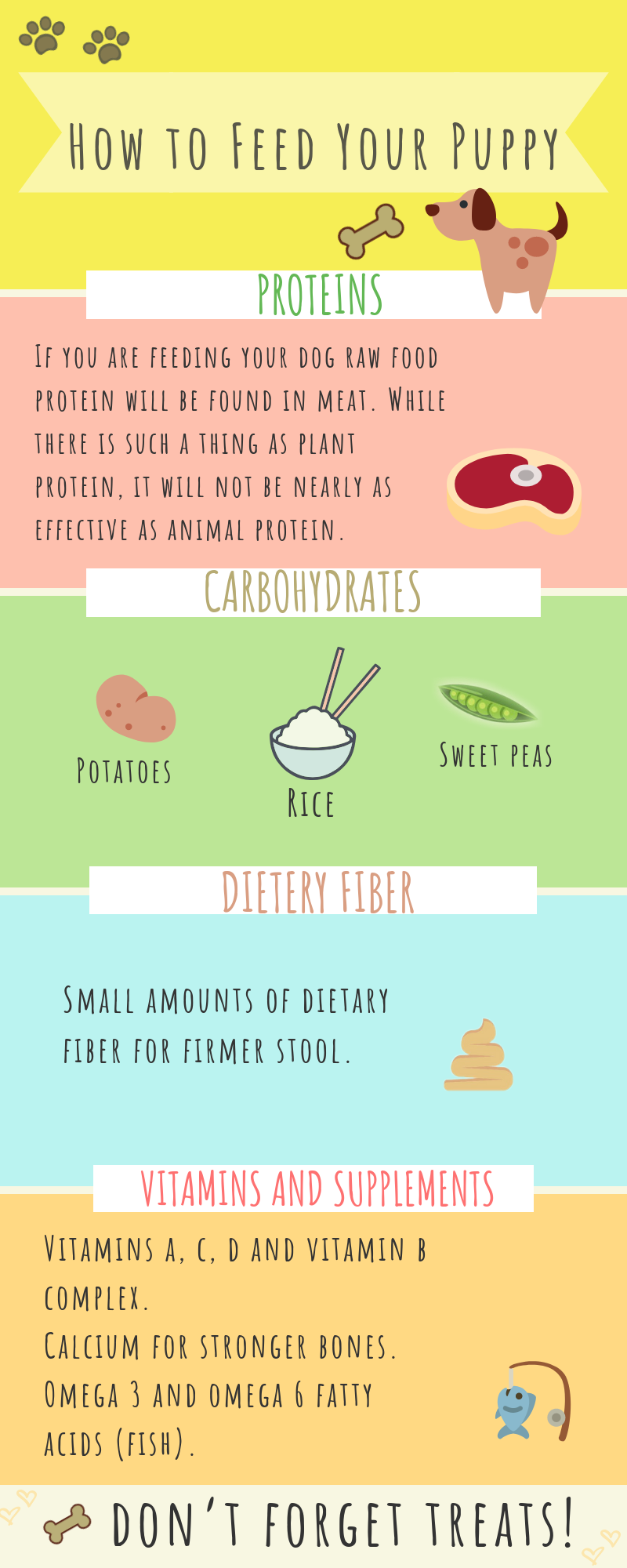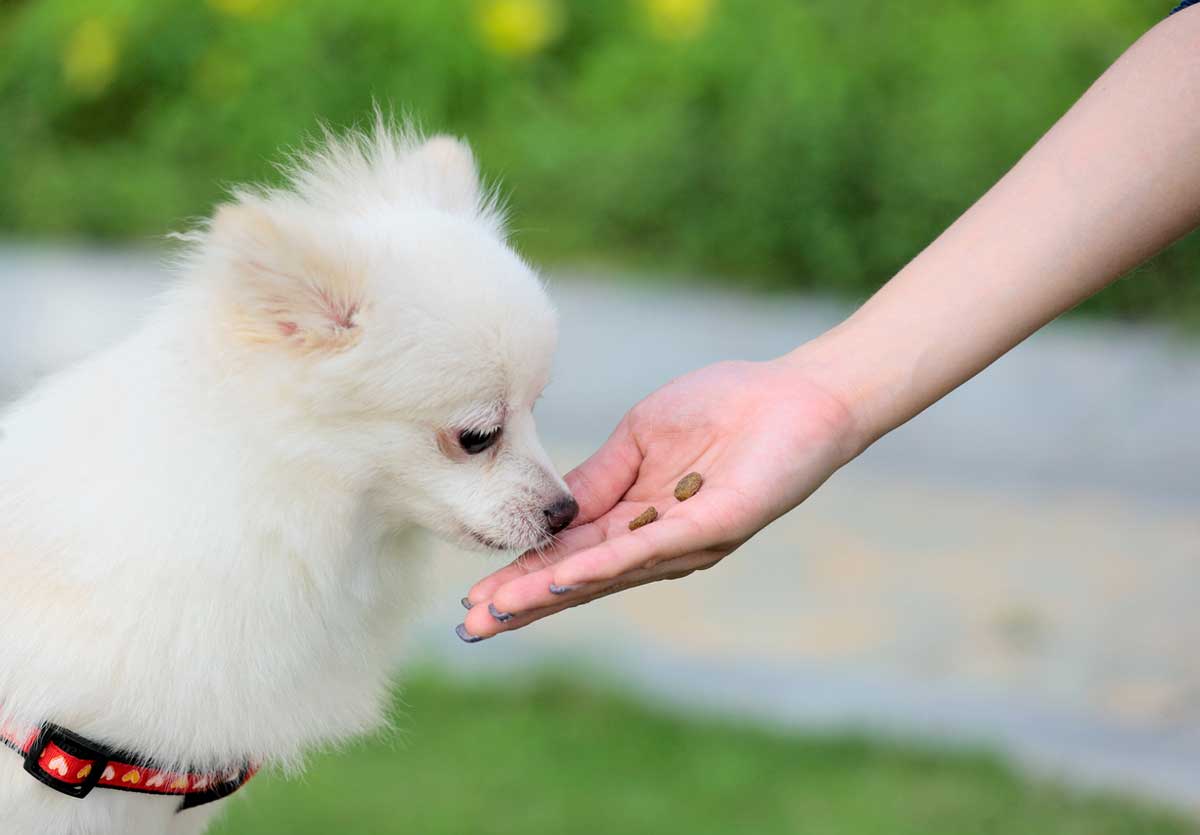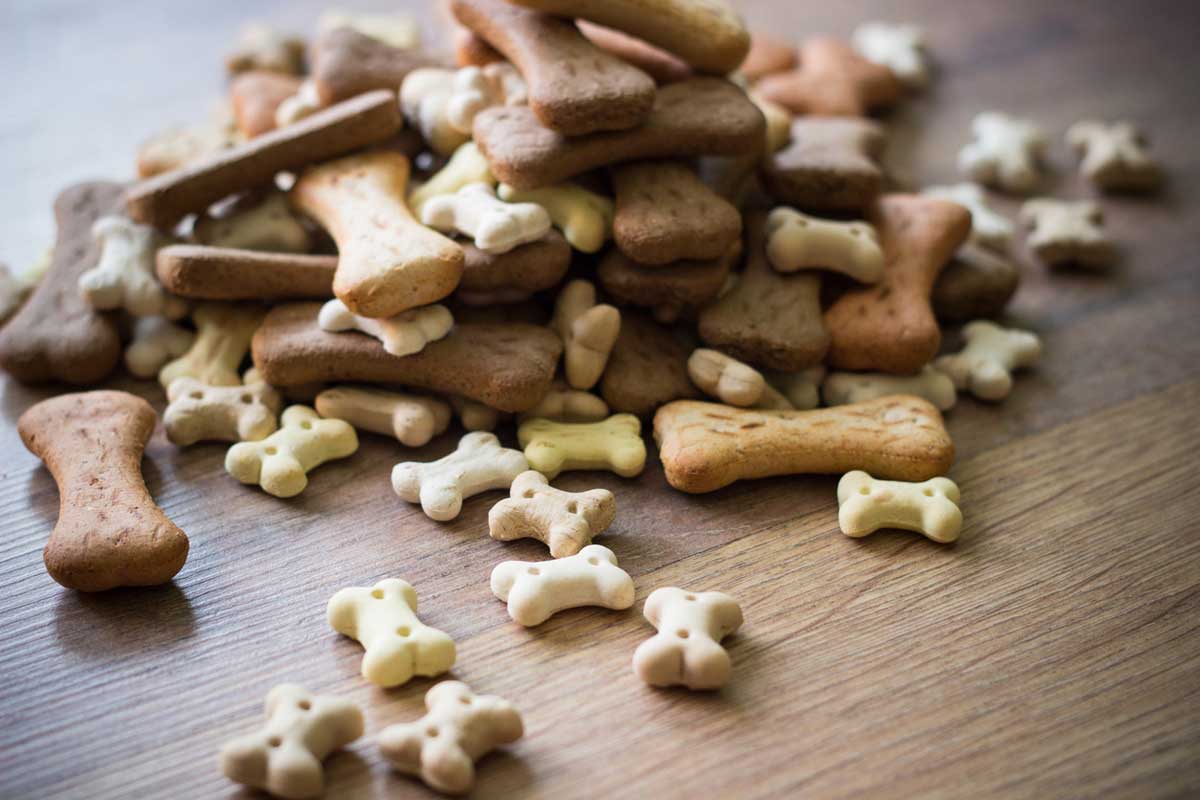Bringing a young puppy home is one of the best feelings in the world. Regardless of the dog in which they will grow up into, they begin as an adorable fur ball that is always looking at you with admiration and love. As is with all the best things in life, having a puppy is not as easy as it sounds. Feeding your puppy correctly, as well as housetraining it, and teaching it some commands is essential for the best development of your canine companion.
Good dog food is vital, as it will not only ensure the health and wellbeing of your puppy but is also a key factor when it comes to obedience training and nurturing a good relationship with your dog.
Contents
- InfoGraphic
- What is Puppy Food?
-
- What makes Puppy Dog Food Special?
- Before You Adopt
- Size of the Dog Breed
- Health Issues
- Vision
- Shots
- How Viruses Work
- Bone Structure
- Organ Development
- How to Feed Your Puppy?
- Early Days
- Young Puppy Feed
- Coming on Three Months
- Almost an Adolescent Dog
- Various Nutrients Needed
- Protein
- Carbohydrates
- Dietary Fiber
- Vitamins and Minerals
- Supplements
- Treats
InfoGraphic
What is Puppy Food?
As the name implies, it is a specialized type of food that is given only to very young dogs. In the same way, as adults do not eat baby food and babies can’t consume adult food, puppy food is different than adult dog food or senior dog food.
It is a big misconception that puppy food is by default of higher quality than normal dog food. As with regular food for dogs, the quality of the product varies with the brand. Additionally, even the products that are in the very top of the market in terms of quality might not be adequate for all breeds of dogs.
What makes Puppy Dog Food Special?
The main difference between puppy food and adult dog food is in the amount of protein. Puppies need loads of protein to start growing quickly, as they will be gaining weight and muscle mass on a daily basis. To promote this growth, they will use mostly protein. Unlike with dogs that are just larger, and thus need more food in general, puppies need only more protein. Including more adult food to compensate may give enough of the animal protein but will also provide too many carbs, as well as too much dietary fiber. This misbalance can lead to obesity, as well as other issues that your puppy can get from eating the wrong food.
Before You Adopt
Before you adopt a puppy, you will need to get information about its origins, breed, and health specifics. Even if you are taking a mixed breed dog, it is important to know if they are expected to grow into a large dog or a small one. Additionally, it would be good to know if there were any medical problems exhibited by the parents.
You should also demand to get a chart to know if the dog is vaccinated and tested for any medical issues. Take this chart to your vet and consult if the results impact the way you should be feeding your dog. A well-balanced diet is not the same for dogs that have, for instance, bone issues such as hip dysplasia, as it is for completely healthy dogs.
Size of the Dog Breed
It is important to remember that the ultimate size of the dog doesn’t factor in the amount of food they should be eating as a puppy. You will always portion your dog’s meals compared to their current weight, regardless if you are raising an Alaskan Malamute or a Toy Poodle.
The breed, and therefore the ultimate size, of the dog, is important when considering supplements, vitamins, or minerals, as some races require a larger amount of these oligo-elements than others. These supplements should not significantly influence the weight of the food given to the dog.
Health Issues
Depending on the breed and more recent ancestry of your puppy, they might have increased risk for some medical issues. Additionally, some problems may be caused by an inadequate diet or can be solved by introducing certain nutrients. It is essential that you discuss all of these issues with your veterinarian and inform yourself about both the maladies your dog can catch, and with the foods and medicine that solves these problems.
Also, there is a difference if you are adopting a puppy, or if the puppy is born in your household. In the latter case, you will need to adjust the diet of the mother, as well as look after any pathogens that may harm the puppies in their most vulnerable period.
Vision
As most pet owners are aware, dogs are born with their eyelids shut. For the first two or three weeks, they will be unable to see and would only stumble around the place their mother leaves them. While all of the food they receive in this period would be from their mother, you should be aware of any pathogens or other risks that they can stumble upon in this period.
Make sure that your puppies are not in a brightly lit area, as this can damage their tender eyes. Additionally, putting extra vitamin A in the mother dog’s diet would transfer to the puppies. This will promote the development of their eyes and better ocular health.
Shots
Puppies should receive regular shots when they are six, twelve, and sixteen weeks old. You may be up to ten days late for a vaccine, but not more than that.
The American Kennel Club recommends giving your dog shots against distemper, measles, parainfluenza, and bordetella when they are six to eight weeks old.
At ten weeks, your puppy should receive the DHPP vaccine which is against distemper, hepatitis, parainfluenza, and parvovirus, as well as additional shots against coronavirus, leptospirosis, Bordetella, and Lyme disease.
Finally, at some point when your pups start running around, you should give them a rabies shot, as well as repeat the DHPP vaccine. This should make it safe for your young dog to run around and explore.
How Viruses Work
As there is a growing misconception that viruses are not a big deal, it is important to address the major health risks that all unvaccinated dogs face, especially from rabies and distemper. These viruses are transmitted by the saliva of wild animals that are immune to the symptoms.
Distemper is especially harmful to dogs younger than six months, as the virus quickly spreads through their system, attaching itself to cells. The virus then infects the cells with its RNA, causing more viruses to form inside the host cell, making it burst.
In most cases, an unvaccinated dog that catches this virus will slowly start to lose bodily functions and finally die.
Bone Structure
While the development of highly nutritious dog food has made it possible for no dog to be hungry, regardless of the home budget, it has also created an issue with bone health in dogs.
The primary reason is that puppies are now born significantly larger than before. They squeeze through birthing canal, sometimes causing hip dysplasia as well as elbow dysplasia. These issues should be addressed as soon as possible, as it is relatively easy to solve in puppies and very difficult to fix once all of the bones and muscles have formed.
Additionally, overeating can lead to puppy obesity. Obesity creates a strain in the legs and spine of the puppy, causing deformities and other problems. This is why not overfeeding your dog at any stage in life is essential for their health and well being.
Organ Development
The puppy’s genetics will inform the speed of organ development and the general metabolism. Somewhat counter-intuitively, small breeds have a faster metabolism and should eat more often than larger breeds, even while they are generally the same size.
To have proper organ development, your puppy should eat at least three times a day, and up to six times for toy breeds.
An essential thing to remember is that while adult, and especially senior dogs, have multiple benefits from dietary fiber, this is not something you want a lot of when feeding your puppy. Too much fiber will slow down their metabolism and can even lead to blocked bowels, which is a major problem for puppies.
How to Feed Your Puppy?
It is important to take your dog’s diet seriously. This doesn’t mean forcing the dog to eat, or even jumping through hoops to prepare everything from scratch. Being mindful in this regard means that you will consult your vet and do some research about the possible specific needs of your puppy’s breed and condition.
First days are relatively easy as the pups will rely on the mother to feed them. As they are growing in the first three weeks, you will notice which dogs are bigger than others, as well as if some look healthier than others. All of this should inform your actions when feeding your puppy as it grows. If you are adopting, ask the breeder about this, as they will know exactly how the dog was born and will have a health chart with all of the administered medication to either the brood or the specific puppy.
Early Days
As dogs are mammals, same as humans, they rely on their mother’s milk to feed them for the first period of their life. Your job is to make the mother’s food easily accessible and highly nutritious. Also, don’t forget always to have fresh water near the food.
Puppies will want to eat often, meaning that you shouldn’t force the mom to travel a lot to feed herself.
Young Puppy Feed
This will start at about three to four weeks. The best possible food for puppies that have just started eating sold food is fresh food with a lot of protein. As they will have a problem chewing through most meats, your best course of action is to mince the meat in a blender. Chicken, turkey, or fish is best, just make sure that it doesn’t have any bones.
If you don’t have access to raw food, wet food meant for puppies is the second best option. If you can find it already minced, that would be great, but if not they can also pass through a blender.
Apart from feeding your dog, you will also want to give them a fairly large clean bone once they are about a month old. This will help them relieve the pain from tooth growth.
Coming on Three Months
At this point, you may be relying more on wet dog food than on raw food. Pay attention that the food should always be specifically made for puppies. It should also be very rich in protein.
The amount you should give the dog is always dependent on their weight. Dogs up to three months old should consume around 10% of their weight in food each day, focusing mainly on protein and fat.
Depending on your dog’s type, size, and rate of development, you may want to introduce vitamins and supplements at this point.
Almost an Adolescent Dog
Once the dog is six months old, their daily meals should weigh about 5% of their total weight. Also, this is the time where a bit more ingredients should be introduced, as well as treats.
If you plan on training your dog with treats, which is the usual way, check the nutritional value of the treats and balance the dog’s diet accordingly.
Various Nutrients Needed
There are several sets of nutrients that every pet owner should be aware of when feeing their dog. Depending on their age, size, breed, and health the amount of each group will change, but there should always be a balance that will give your dog everything it needs without overfeeding them.
Additionally, pet owners should be aware of any human food they might give to their puppy, with all of the risks and benefits that may bring. Even though your young canine will be thrilled by the fact that you are giving it the same food you are eating, you need to know which human foods are toxic to dogs and which are okay.
Protein
When it comes to feeding your puppy, protein is the essential nutrient you are looking for. They are large and complex molecules that are used to build up muscle as well as many large organ groups. They build muscle without a large expenditure of energy, making your puppy active, healthy, and ever growing.
If you are feeding your dog raw food protein will be found in meat. While there is such a thing as plant protein, it will not be nearly as effective as animal protein.
Carbohydrates
Carbs are often disregarded from nutritional needs as, while they are important, they are also unavoidable. Even the best wet dog food on the market will have a significant carbohydrate content used as a binder or filler.
The most important thing to remember about this nutrient is that the source matters. Strictly avoid any wheat, soy, or corn. Rather, use carb sources like rice, potatoes, or sweet peas.
Dietary Fiber
The misconception that dietary fiber is always good can be sourced to breakfast cereal commercials and is not true in the slightest. While a little bit of dietary fiber will help bind the contents of the diet and make the dog’s stool firmer, too much fiber will slow down the dog’s metabolism and lead to constipation, as it does with humans.
Also, unlike us, our four-legged friends gain no nutritional value from fibrous food, making it especially useless when it comes to puppies.
Vitamins and Minerals
Whether you are feeding your puppy raw food or buying canned food, you will need to think about purchasing additional vitamins and minerals to supplement their diet. These should include vitamins A, C, and D, as well as the vitamin B complex. Giving your dog minerals such as calcium will help their bones grow stronger.
While vitamins bring major benefits to your dog’s health and well being, they should be administered in small amounts. Too many vitamins and minerals will put a strain on your dog’s kidneys, and your puppy doesn’t need that.
Supplements
While some nutrients can be found in regular canine diet and only occasionally need to be supplemented, some are not found in common dog food and should be considered if required.
Most important of these supplements are Omega 3 and Omega 6 fatty acids that are found in fish. While more and more foods include them in their formula, they are not as common as they should be. If your puppy food doesn’t contain them, you will need to supplement them.
Finally, consult your vet if your puppy lacks any enzymes that will help with their digestion and food absorption. Depending on the breed they may be lacking quite a few of them and introducing these enzymes might help your dog get the most out of their food.
Treats
Once you start training your dog, you will always need to find yourself with a pocket full of treats while walking your dog. Although these treats usually make only a small portion of your dog’s diet, they are not insignificant and should be calculated into their nutrition plan.
Treats will usually have more calories per weight than regular food, forcing you to either cut them into smaller pieces or use them more sparingly when training your dog.
Conclusion
Having a puppy is one of the best feelings in your life, and trust that feeding your puppy is one of the best feelings in its life. Food is an essential part of an animal’s life, and if you are to feed your puppy good and nutritious food, you will see the benefits show on them. Puppies that are well fed grow faster, are more active and less susceptible to various diseases.
If you invest just a little bit of time in research and consultation, you will see a great return in the form of a lovable fur ball that will become your best friend in the world.
I grew up in a household that was filled with animals. I believe that my fate as a dog-loving person was sealed in early childhood since my parents owned several dogs of varying sizes and breeds. There was no choice but to take care of and learn about dog habits and the best animal care practices — otherwise, I’d be clueless about how to go about the creatures I was surrounded by day and night.
As a life-long puppy lover, I know a thing or two about dogs and how to go about caring for them in the best way possible. Although I’m not a professionally trained dog behaviorist, trainer, or veterinarian, all of my knowledge and experience with canines comes from a place of love and a deep-rooted passion for dogs and animals in general.
Seeing as dogs kept me company throughout every stage of my life, I decided to follow a different path in my academic life and obtained a Bachelor’s and Master’s degrees in Marketing Management and Digital Advertising, which ultimately allowed me to combine my professional training and personal experience by creating the ultimate dog lover’s resource website! Along with my husband, Dave, I run MySweetPuppy for like-minded dog lovers who want to have a single, clear, and reliable information source about anything and everything related to dogs and their well-being.





![[HOW TO] Get Rid Of Puppy Worms Today](https://mysweetpuppy.net/wp-content/uploads/2020/09/How-much-should-I-feed-my-8-week-old-lab-puppy.jpg)

